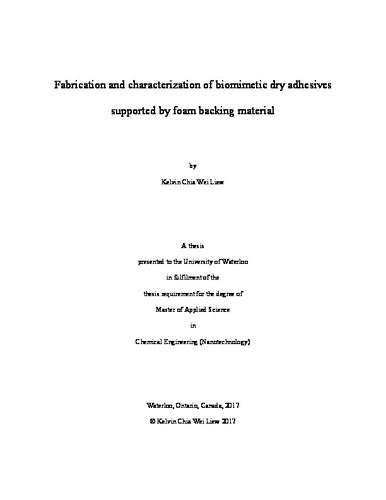UWSpace will be migrating to a new version of its software from July 29th to August 1st. UWSpace will be offline for all UW community members during this time.
Fabrication and characterization of biomimetic dry adhesives supported by foam backing material
| dc.contributor.author | Liew, Kelvin Chia Wei | |
| dc.date.accessioned | 2017-08-23 20:44:59 (GMT) | |
| dc.date.available | 2017-08-23 20:44:59 (GMT) | |
| dc.date.issued | 2017-08-23 | |
| dc.date.submitted | 2017-08-21 | |
| dc.identifier.uri | http://hdl.handle.net/10012/12184 | |
| dc.description.abstract | Using sacrificial templates to create 3D structures is commonly employed in various fields such as tissue engineering and water remediation to create complex and high surface area scaffolds. Herein, several sacrificial templating techniques are tried, tested, and evaluated and several methods for creating 3D porous material are discussed, including: solvent casting particulate leaching (SCPL) and simple sugar and salt leaching. The porous material is then integrated with polymer soft lithography patterning to create a single functionally graded adhesive (FGA) material to use in dry adhesive applications. The use of a soft foam backing layer helps to improve the compliance and flexibility of the adhesive pad, thus enhancing peel tolerance, buckling, and deflection and vibration resistance. A dry FGA based on film-terminated silicone foam is developed utilizing the polymer foam's capacity to absorb large amounts of energy and so deliver high adhesion and peel resistance. The fabrication technique is based on simple sugar cube templating of common elastomers, followed by film termination of the polymer cubes using the same material. Dependencies of the pull-off adhesive force and energy release rate on preload and foam thickness are systematically investigated through a series of axisymmetric indentation/de-bonding tests. The contribution of the foam backing layer to the overall compliance and adhesion is analysed and discussed. The developed elastic film-terminated structure strongly enhances the pull-off force and work of adhesion, and can be employed in the transport of delicate objects, as demonstrated in the pick and place of a silicon wafer. Furthermore, the proposed foam-based FGAs can be readily detached from the adherent surface by applying shear deformation between the pad and the surface. This research clarifies the role of mechanical graded properties in adhesion and can have technical implications in the development of a simple but effective dry adhesive material for mounting and transporting objects using automated robotic devices. The film terminated dry adhesive pads were further developed to investigate the feasibility of using a foam backing material as a universal platform to improve the adhesive properties of other terminal surface morphologies. Integrating other fast prototyping technologies as an alternative to lithographic templating techniques, scaled acrylonitrile butadiene styrene (ABS) 3D printed mushroom capped terminal structures are determined to be comparable to polyacrylate microstructure templated moulds. The effect of the foam is systematically evaluated using a similar axisymmetric indentation/de-bonding test with a probe of a large radius of curvature. Contact splitting through the control of terminal structures in both micro and millimetre scales shows improved contact properties with the addition of foam backing material. The mushroom capped adhesive pads are employed to demonstrate shear peel tolerance and cold temperature surface tolerance demonstrations. Lastly, various sugar and salt templating techniques are explored and optimized for consistency and repeatability to select the material most suitable for current research. Statistical analysis is used in the selection process. A linearly approximated model to determine the pull-off force from foam porosity and stiffness parameters are reported as sample candidates. Model estimates find that the density of sugar granules and the applied preload force are the mostly significant contributors to increasing pull-off force. | en |
| dc.language.iso | en | en |
| dc.publisher | University of Waterloo | en |
| dc.subject | Polydimethylsiloxane | en |
| dc.subject | Dry adhesive | en |
| dc.subject | Foam | en |
| dc.subject | Soft lithography | en |
| dc.subject | Functionally graded adhesive | en |
| dc.subject | 3D printing | en |
| dc.subject | Biomimetic | en |
| dc.title | Fabrication and characterization of biomimetic dry adhesives supported by foam backing material | en |
| dc.type | Master Thesis | en |
| dc.pending | false | |
| uws-etd.degree.department | Chemical Engineering | en |
| uws-etd.degree.discipline | Chemical Engineering (Nanotechnology) | en |
| uws-etd.degree.grantor | University of Waterloo | en |
| uws-etd.degree | Master of Applied Science | en |
| uws.contributor.advisor | Zhao, Boxin | |
| uws.contributor.affiliation1 | Faculty of Engineering | en |
| uws.published.city | Waterloo | en |
| uws.published.country | Canada | en |
| uws.published.province | Ontario | en |
| uws.typeOfResource | Text | en |
| uws.peerReviewStatus | Unreviewed | en |
| uws.scholarLevel | Graduate | en |

